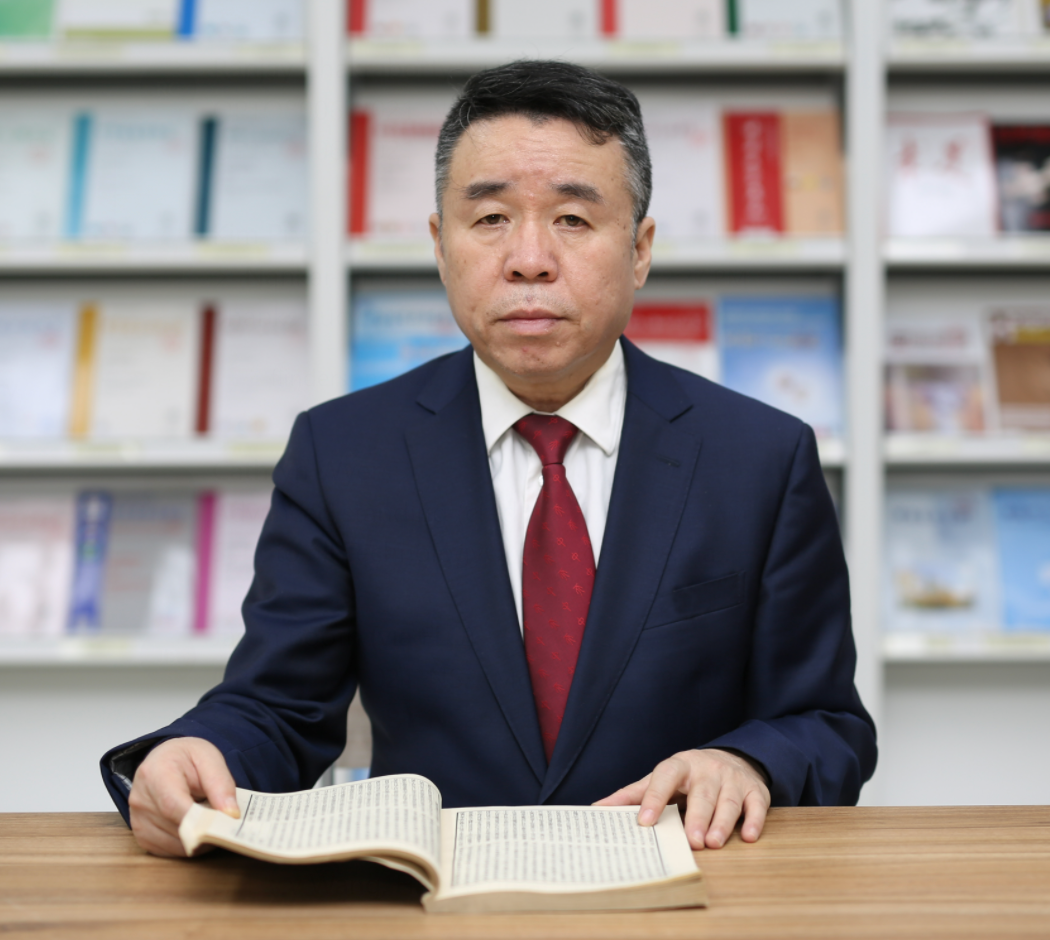
Standing at the frontline of the COVID-19 pandemic, Dr LUO Mingchi has seen the necessity for calm and rational management within China’s public health system. As director of the Second Affiliated Hospital of Tianjin University of Traditional Chinese Medicine, he has been able to provide decisive management decisions that have benefitted the wider community, and he credits the skills and knowledge learned from his MHA studies for helping his capability to perform under pressure.
When Dr LUO Mingchi commenced in the Flinders-Nankai program, there were many Masters programs in clinical medicine and public health to choose from in China, although few of the degrees combined clinical medicine and management. Therefore, he realised the Flinders-Nankai MHA course offered the winning combination of course ingredients that had been sought after by hospital administrators since the program’s inception.
“Most hospital managers have a public health background but a lack of systematic management concepts and knowledge system training,” says Dr LUO. “The MHA program presented by Nankai University and Flinders University introduced advanced western hospital management concepts, and was the only program of its type at the time in China. I was impressed by it.
Dr LUO Mingchi took note that while the MHA program introduced students to western concepts, it was also focused on China’s prevailing national hospital and health service conditions. “The curriculum was not only professional, but also unique. The training objectives of the program were consistent with my work objectives. It proved to be the most suitable course of study for my career development.”
He says the course exposed its students to many of the leading international concepts of hospital management, which gave them terrific insight. “The forms of classroom presentations were flexible, including case teaching, group discussion, group work and debate. It is not easy for each learning group to design a plan independently and clarify it from the line of reasoning to implementation – but this is what “What we learned during the program is now of great help to my work. My studies have greatly improved my comprehensive quality and management ability.”
After graduating in July 2006, Dr LUO Mingchi started doing research on physician-patient communication, and began focusing on hospital management and medical and health management.
“I was the director of Hedong District Health Bureau in Tianjin and now I am the President of the Second Affiliated Hospital of Tianjin University of Traditional Chinese Medicine,” he says. “The program has had a huge impact on my career. When I was a child, I had always wanted to be a doctor. Now I am a doctor and a hospital manager, and have been recognised for several other professional achievements, which is beyond what I could have hoped. All of this has enriched my personal life.
Dr LUO Mingchi identifies the great leaning outcomes of his MHA studies as obtaining knowledge and confidence in: establishing three-line thinking that follows the main thread, the baseline and the warning line; a deep understanding of the importance of physicianpatient communication; establishing the inspection index system of ‘three wins and one satisfaction’ within an integrated health care system; and establishing a three-level management mode within a regional health system.
He says he has been able to successfully implement all these systems and much more since his graduation.
An often-overlooked benefit of Masters studies is the sense of fraternity that develops among both students and staff, and the great enduring value of this is not lost on Dr LUO Mingchi. “We often contact each other, and gather to hold salons from time to time,” he says. “Most of us are not only classmates but also colleagues in the same industry, so we often discuss problems that confront us in our workplace. Being able to talk with peers at this level has helped me a lot. We all cherish the valuable experience of having studied together.”
Dr LUO Mingchi acknowledges that it takes a great deal of dedication, application and knowledge to be both a good doctor and a good health services director. “In the context of the current global pandemic, hospitals are facing unprecedented challenges,” he says. “After the pandemic, we face even greater challenges because I believe people’s demand for health management will increase.”
With this increased demand for health management, Dr LUO Mingchi predicts that the integration of disease prevention, disease control and medical systems will be strengthened. However, to achieve this he knows the traditional hospital system will face considerable new challenges, but also have some significant development opportunities.
“We will have higher requirements for hospital operations and management, but I believe we can meet those higher levels,” he says. “I hope that with my efforts, the hospital is better placed to meet all of these challenges, seize the opportunities and embrace the future.”
站在抗击新冠疫情的最前线,雒明池医生 意识到了在中国公共卫生系统中保持冷静 而合理的管理的必要性。 作为天津中医药 大学第二附属医院的院长,他能够做出决 定性的管理决策从而使整个社区受益,并 且他将自己在重压下所表现出的能力归功 于他在医院管理硕士课程中获得的技能 和知识。
雒明池医生开始在南开大学-澳大利亚弗 林德斯大学合作项目学习时,那时的中国 有许多临床医学和公共卫生硕士课程可 供选择,但是很少有学位课程是将临床医 学和管理结合在一起。因此,他意识到南开 大学-澳大利亚弗林德斯大学合作举办的 医院管理硕士学位教育项目将这两大要素 成功的结合起来,所以项目自设立以来一 直受到医院管理人员的认可。
雒医生说:“大多数医院管理人员都拥有公 共卫生背景,但他们缺乏系统的管理理念 和知识体系培训。南开大学-澳大利亚弗林 德斯大学合作举办的医院管理硕士项目引 入了先进的西方医院管理理念,并且是当 时在中国唯一开设这一类型课程的合作项 目。这给我留下了深刻的印象。”
雒明池医生注意到,医院管理硕士项目在 向学生介绍西方理念的同时,也关注中国 目前的公立医院和卫生服务条件。“课程 专业而独特。该项目的培养目标与我的工 作目标一致。事实证明,这是最适合我职 业发展的课程。”
他说,这一课程让学生接触到许多国际领 先的医院管理理念,培养了他们异乎寻常 的洞察力。“课堂演示形式灵活多样,包括 案例教学、小组讨论、小组作业和辩论。对 于每个学习小组来说,独立地制定一个计 划并从理论到实践阐明这一计划是很有难 度的,但这正是我们所取得的成果。”
“直到现在,我们在课程中学到的知识都 对我的工作有很大帮助。 我的学业极大地 提高了我的综合素质和管理能力。”
2006年7月毕业后,雒明池开始进行医患 沟通的研究,并专注于医院管理和医疗卫 生管理。
他说:“我曾担任天津市河东区卫生局局 长,现在我是天津中医药大学第二附属医 院的院长。这个项目对我的职业生涯产生 了巨大的影响。我从小的梦想就是成为一 名医生。现在我既是医生,又是医管理者, 我的几项专业成就也获得了认可,这超出 了我的期望。所有的一切都使我的个人生 活更充实。”
雒明池医生认为医院管理硕士项目的主要 学习成果是获得了知识和信息,体现在:建 立遵循主线、底线和警戒线的三线思维;深 刻理解医患沟通的重要性;在综合医疗体 系中建立“三赢一满意”的指标监测体系; 在区域卫生系统内建立三级管理模式。
他说毕业后他成功地实施了全部这些 系统。
硕士课程的学习有一个经常被忽视的好处 是在学生和教职员工的互助关系,而雒明 池医生确珍视着这一重大且持久的价值。 他说:“我们保持密切的联系,经常聚在一 起举办沙龙活动。我们的关系不仅是同班 同学,也是同行业的同事,所以我们经常讨 论工作中遇到的问题。能够和同龄人在这 个级别上对话让我获益良多。我们都很珍 惜一起学习的宝贵经历。”
雒明池医生承认,要成为一名好医生和优 秀的卫生服务领导,需要具备极强的奉献 精神、卓越的应用能力和足够的知识储备。 他说:“当前,在全球疫情的背景下,医院正 面临着前所未有的挑战。而当疫情过后,则 有更大的挑战等待着我们,因为我相信人 们对卫生管理的需求将会增加。”
随着卫生管理需求的增加,雒明池医生预 测疾病预防、疾病控制和医疗系统的整合 将得到加强。然而,他深知要做到这一点, 传统的医院系统将面临相当大的新挑战, 同时也将获得一些重大的发展机遇。
他说:“大众将会对医院的运营和管理提 出更高的要求,但我相信我们能够满足这 些要求。我希望通过我的努力,医院能够 更好地应对所有的挑战,抓住机遇并拥抱 未来。”

